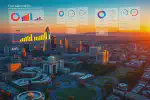Exploring Progressive Policies in San Diego: A Comprehensive Overview

Leadership in Local Governance
Effective local governance requires leaders who understand the complex needs of diverse communities. In San Diego, a city with a rich tapestry of cultures, industries, and neighborhoods, the challenge of governing well demands both vision and practical skill. The best leaders combine strategic thinking with genuine community connection, creating policies that address real needs while building toward a better future.
The Power of Community Engagement
Community engagement is more than a political buzzword — it's the foundation of responsive governance. When citizens actively participate in the political process, through town halls, public forums, and grassroots organizing, the resulting policies better reflect the needs and aspirations of the people they serve. Successful political campaigns understand this and make community connection a central pillar of their strategy.
Economic Development and Opportunity
San Diego's economy is driven by diverse sectors including defense, tourism, biotechnology, and cross-border commerce with Mexico. Effective economic development policy must nurture these existing strengths while creating new opportunities for growth, particularly in underserved communities. The goal is not just economic growth in the aggregate, but broadly shared prosperity that lifts all neighborhoods.
Progressive Policy in Action
Progressive policies in San Diego address critical issues including affordable housing, public transportation, environmental sustainability, and equitable access to city services. The debate over these policies reflects broader national conversations about the role of government in promoting opportunity and addressing inequality. Local governance provides a laboratory for testing innovative approaches to these challenges.
Looking Forward
The political landscape of San Diego continues to evolve, shaped by demographic changes, economic shifts, and new generations of leaders and engaged citizens. Understanding the history of local political campaigns and governance provides valuable context for navigating the challenges and opportunities ahead. The lessons of past campaigns inform the strategies of future leaders.